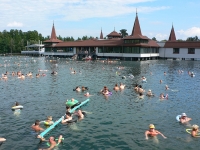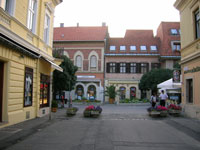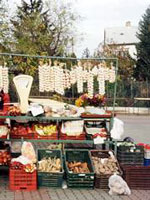Lake Balaton Travel Guide
Lake Balaton is the largest freshwater lake in Central Europe and the most popular holiday region in Hungary. Lining both shores of its 48-mile (77km) stretch are many towns and resorts, and the north and south shores are distinctly different in character, offering something for everyone.
The south shore is thronged by a string of largely uniform holiday resorts and high-rise buildings where crowds of young people congregate for hedonistic holidays. Besides the pretty beaches and good swimming options, there are numerous land and water-based activities while at night the discos pulse until the early hours. Siófok is the largest and busiest resort and it dominates the southern shore during the summer months, but it is almost completely dead in winter.
By contrast, the northern shore has limited waterfront development due to its deeper, colder waters and reed beds. Its attractions are more historical and cultural in nature. Although there are resorts here, it is generally a destination embraced by travellers looking for picturesque scenery, interesting towns, and mineral spas, complemented by the fine wines from the nearby hills of Badacsony, rather than a party scene. Many of the villages on the shores of the lake are home to a number of medieval ruins and fortresses to explore.
Lake Balaton has been a popular recreation area since the Roman times, when the aristocracy built villas and set up health spas here. It was also a famous winegrowing region and the graceful rolling hills, cool water, and warm sunshine still provide the perfect setting and climate for both holidays and vineyards.
Things to do in Lake Balaton
Lake Balaton is one of the most popular holiday destinations in Hungary and the largest freshwater lake in Central Europe. The south banks are full of modern beach resorts for those who desire nothing more than fun in the sun and a rollicking nightlife.
The northern banks still boast some picturesque old villages and historical sites, as well as some great wineries. Although the lake is less sandy and not as good for swimming as in the north, the scenery is arguably more beautiful.
When it comes to the south, things to see and do in Lake Balaton revolve mainly around water sports and partying. Apart from the popular beach resorts, the southern edges of the lake include the Golden and Silver Shore beaches (Aranypart and Ezüstpart).
Breaking away from beach life, tourists can take a walk down either the Beszédes or Petõfi promenades. The Lutheran Church in Oulu Park is also a notable attraction. A quick excursion to the nearby town of Zamárdi and a visit to the town's Ethnographic Museum are also worth the time.
The oldest and most popular spa resort on the scenic northern banks is Balantonfüred, which has an easy-going sophistication and relaxed atmosphere. Jutting out into the lake and almost joining the northern and southern shores is the Tihany Peninsula, which has an old Benedictine Abbey in the quaint town and is surrounded by a nature reserve that many consider to be the most beautiful place on the lake.
To the west and marking the end of the northern shore is the interesting town of Keszthely with its Baroque Festetics Palace. Close to Keszthely, just removed from the banks of Lake Balaton, is Europe's largest thermal lake, Heviz, which is also a very popular attraction in the area and offers spa treatments as well as swimming in the steam-shrouded lake.
With over 120 miles (200km) of cycle tracks around the villages and shores of Lake Balaton, cycling is a popular way to get around. Visitors to Balaton between May and September can make use of the Balaton ferry to cross between the lake's southern and northern shores (Tihany and Szántód), while excursion boats cruise between a number of ports along the shores of the lake. Local buses are also available and it is possible to drive between different towns surrounding the lake.

Heviz
Lake Hévíz is the world's largest thermal lake, a most extraordinary sight with its huge milky blue surface covered in water lilies and steam. The warm water wells up from a volcanic crater spring about 40 metres (128ft) below the surface, with the recommended maximum time in the water during any session being one hour.
The mud is said to be slightly radioactive and good for various medical conditions, but only in small doses. A pavilion in the centre is reached by a covered bridge, and indoor swimming takes place in an area enclosed with plexiglas. Gaps in the plastic lead to the rest of the lake where swimmers can float among the water lilies and swim between platforms bobbing on the surface. There are also various other spa and health treatments on offer.

Keszthely
Keszthely is a university town that was first settled during Roman times where, today, visitors can enjoy trendy cafes, tree-lined streets and busy market areas. Its most important sight is the Festetics Palace, with the Helikon Palace Museum and Library both in one of its Baroque wings. Varosi Strand is great for travelling families, with its beach and amusement area. It has water slides, a big pool and various play spaces, as well as nice lawns, a beach and loungers. Keszthely likes to describe itself as the capital of Lake Balaton and it's the best town from which to explore the lakeside surroundings, including the thermal lake at Hévíz and the nearby Kis Balaton, a wetland reserve perfect for birdwatching.

Balatonfured
Balatonfüred has been the most fashionable resort on Lake Balaton since the 18th century when the medicinal centre was established, and people are still drawn to its healing thermal waters. While the mineral baths are reserved for patients, Balatonfüred remains popular with tourists as there are three good beaches for swimming, sunbathing and yachting, and there are also a number of cycle tracks along the lake and through the surrounding region. A wine tasting festival is held in August annually and the famous Anna Ball takes place on the weekend closest to 26 July (Anna Day) at the Anna Grand Hotel.
Hungary travel info
Electricity
Electrical current is 230 volts, 50Hz. European-style two-pin plugs are standard.
Language
Hungarian (Magyar) is the official language, but German is widely spoken, especially in the areas close to the Austrian border. English is spoken in tourist areas and most hotels.
Money
Although Hungary is part of the EU it does not use the euro. The official currency is the Hungarian forint (HUF), which is divided into 100 fillér. Most international credit cards are accepted at shops, restaurants and hotels; ATMs are available in towns and cities throughout the country. Banks usually open between 8am and 3pm on weekdays and some are open on Saturdays.
Tipping
Taxi drivers, waiters and other professions in the service industry expect a tip of 10 to 15 percent in Hungary. It's customary to add the tip to the bill or hand it to the waiter rather than leave it on the tabe.
Health
A reciprocal health agreement with countries in the EU provides nationals with free emergency healthcare on presentation of a European Health Insurance Card (EHIC). After Brexit, the Global Health Insurance Card (GHIC) replaced the European Health Insurance Card (EHIC) for UK citizens. The GHIC allows UK citizens access to state healthcare during visits to the EU. The GHIC is not valid in Norway, Iceland, Liechtenstein or Switzerland, nor is it an alternative to travel insurance. All big towns have pharmacies, but anyone requiring specific medication should bring a supply with them as local medicines may be unfamiliar. Tourists should make sure that if they're travelling with prescribed medications they bring along a letter from their doctor stating conditions and prescribed medication. Public health facilities are good but comprehensive travel insurance is still recommended.
Safety
Most visits to Hungary are trouble free, but normal precautions against petty crime should be taken. Pick pocketing and bag snatching are a risk on crowded public transport and in other places frequented by tourists. Visitors should make use of hotel safes to store valuables and avoid displaying conspicuous wealth. Carrying copies of important documents such as passports is always a good idea.
Travellers should also ask to see the menu and price list when ordering drinks or food, and check their bill carefully before settling up. Some bars and restaurants have been known to charge extortionate amounts and take tourists to cash points to demand more money. Travellers should report any such incident to the police.
Local customs
Hungarians are generally open and friendly, readily striking up conversation. Men and women greet each other by shaking hands, and close friends kiss each other lightly on each cheek. Older men may bow to women and kiss them on the hand.
Doing business
A handshake is the standard form of greeting when doing business in Hungary and, in mixed company, it's usually women who initiate. Conservative suits and ties are standard business dress and businesspeople should be addressed by their title and surname.
Business cards are often exchanged; Hungarians usually list their surnames first. It is useful to have a local representative when doing business in Hungary, acting as an interpreter and go-between. It is important to invest time in building relationships; socialising is a key element and face-to-face meetings are vital.
Punctuality is important on all occasions and cancelling a meeting at the last minute may be detrimental to a business relationship. There may be plenty of red tape to get through too, so negotiations can be slow-moving. Business hours are usually from 8am to 4pm Monday to Friday.
Duty free
Travellers over the age of 17 arriving by air from countries outside of the EU can import the following duty-free: 200 cigarettes or 50 cigars or 100 cigarillos or 250g of tobacco; 4 litres of wine, 16 litres of beer and either 1 litre of spirits containing more than 22 percent alcohol or 2 litres of alcoholic beverages containing less than 22 percent alcohol; and other goods up to a value of €430.
Communications
The international access code for Hungary is +36. WiFi is available in most cafes, hotels and restaurants; travellers can purchase local prepaid SIM cards for unlocked phones.
Passport & Visa
The borderless region known as the Schengen Area includes the following countries: Austria, Belgium, Czech Republic, Denmark, Estonia, Finland, France, Germany, Greece, Hungary, Iceland, Italy, Latvia, Lithuania, Luxembourg, Malta, The Netherlands, Norway, Poland, Portugal, Slovakia, Slovenia, Spain, Sweden, and Switzerland. All these countries issue a standard Schengen visa that has a multiple entry option, and which allows the holder to travel freely within the borders of all the aforementioned countries. All visitors to Hungary, other than EEA members, should ensure that their passports are valid for at least six months beyond the expiry date of their visa. Foreign passengers must be in possession of a return or onward ticket, and the necessary travel documentation for their next destination. Additionally, visitors must hold the equivalent of HUF 1,000 per day of stay, in hard currency, although the following documents are also accepted: a major credit card, a letter of invitation, proof of accommodation (reserved and paid for), or a document authorising the visitor to withdraw cash from a bank in Hungary. It is highly recommended that travelers' passports have at least six months' validity remaining after the intended date of departure from their travel destination. Immigration officials often apply different rules to those stated by travel agents and official sources.
Entry requirements
US citizens must have a passport that is valid for three months beyond the period of intended stay in Hungary. No visa is required for stays of up to 90 days within any 180-day period.
UK citizens must have a passport issued within the past ten years and valid for three months beyond the period of intended stay in Hungary. No visa is required for stays of up to 90 days within any 180-day period.
Canadian citizens must have a passport that is valid for three months beyond the period of intended stay in Hungary. No visa is required for stays of up to 90 days within any 180-day period.
Australian citizens must have a passport that is valid for three months beyond the period of intended stay in Hungary. No visa is required for stays of up to 90 days within any 180-day period.
South African citizens must have a passport that was issued within the past ten years and is valid for three months beyond the period of intended stay in Hungary. A valid Schengen visa is required prior to arrival.
Irish citizens must have a passport that is valid for the duration of their stay in Hungary. No visa is required for stays of up to 90 days within any 180-day period.
New Zealand citizens must have a passport that is valid for three months beyond the period of intended stay in Hungary. No visa is required for stays of up to 90 days within any 180-day period.
Useful contacts
Official Hungarian Tourism Portal: gotohungary.com
112 (General in Europe)


